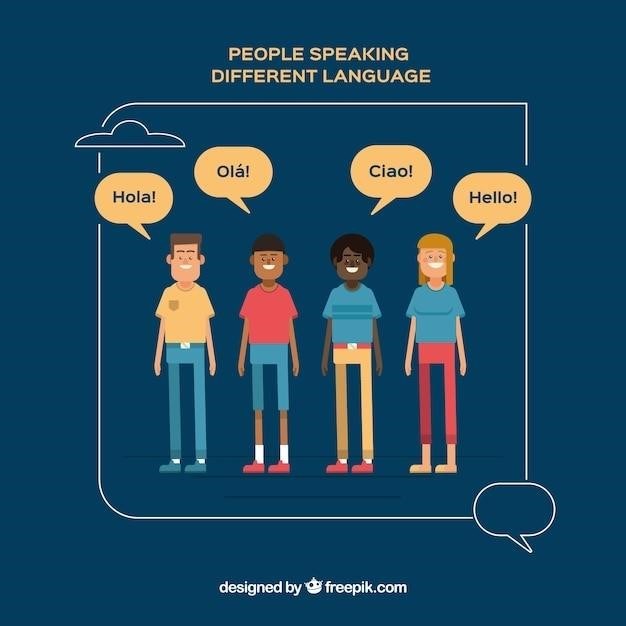
The Four Agreements⁚ A Toltec Wisdom Guide
This guide explores the ancient Toltec wisdom found in Don Miguel Ruiz’s renowned book. Discover the transformative power of these four agreements to achieve personal freedom and create a more fulfilling life. Learn practical steps for self-mastery and improved relationships.
The First Agreement⁚ Be Impeccable with Your Word
This foundational agreement emphasizes the profound impact of our words on ourselves and others. Impeccability with your word isn’t merely about speaking the truth; it’s about speaking with integrity, using your words to uplift and empower, rather than to harm or manipulate. It involves being mindful of the power of language to shape reality, both internally and externally. When we speak impeccably, we align our words with our thoughts and intentions, creating a congruence that fosters trust and strengthens relationships. This includes avoiding gossip, judging others, or engaging in self-criticism. Instead, we cultivate a practice of positive self-talk and compassionate communication. The agreement encourages speaking only what is true and necessary, avoiding idle chatter or hurtful comments. By mastering this principle, we cultivate a sense of personal responsibility for the impact of our words, transforming communication into a tool for positive change. It encourages mindful speaking, ensuring that words contribute to personal growth and harmonious relationships. It challenges us to consider the long-term consequences of our verbal expressions.
Speaking with Integrity⁚ The Importance of Truthfulness
Truthfulness forms the cornerstone of impeccable communication. Speaking with integrity means aligning your words with your actions and beliefs. It’s about being honest, not only with others but also with yourself. This involves acknowledging your limitations and avoiding deception, even in seemingly minor situations. When we speak truthfully, we foster trust and build stronger relationships. People are more likely to believe and respect us when they know we are committed to honesty. Moreover, speaking truthfully creates a sense of inner peace and reduces the mental clutter associated with hiding the truth or engaging in self-deception. It allows for authentic connection, creating space for genuine understanding and empathy. However, truthfulness isn’t about harshness or bluntness; it’s about expressing your thoughts and feelings in a compassionate and considerate manner. It’s about choosing your words carefully and speaking with kindness, even when delivering difficult news. This approach avoids causing unnecessary hurt while still maintaining the integrity of your message. By striving for truthfulness, we cultivate a deeper sense of self-respect and enhance our ability to communicate effectively and build meaningful connections.
The Impact of Words on Ourselves and Others
Words possess immense power, shaping not only our realities but also the experiences of those around us. The words we choose carry energy and influence our thoughts, feelings, and actions. Positive affirmations and encouraging words can uplift and inspire, fostering self-confidence and resilience. Conversely, negative or hurtful words can inflict emotional wounds, damaging self-esteem and hindering personal growth. This impact extends beyond the individual, influencing interpersonal dynamics and relationships. Consider the ripple effect of gossip or unkind remarks; they can sow discord and fracture trust within communities. In contrast, thoughtful and compassionate communication fosters understanding and strengthens bonds between individuals. Our words become a reflection of our inner selves, revealing our beliefs and values. By being mindful of the language we use, we can cultivate a more positive and nurturing environment for ourselves and others. The power of words lies in their ability to heal, inspire, or harm; therefore, choosing our words wisely becomes a crucial aspect of personal responsibility and mindful living. Understanding this impact empowers us to use our words constructively, creating a more positive and harmonious world.
The Second Agreement⁚ Don’t Take Anything Personally
This profound agreement encourages a shift in perspective, urging us to recognize that others’ actions are reflections of their own internal world, not personal attacks against us. When we take things personally, we internalize external judgments and criticisms, allowing them to dictate our self-worth and emotional state. This agreement isn’t about emotional detachment or apathy; rather, it’s about understanding that other people’s behavior stems from their own beliefs, experiences, and emotional baggage, often unrelated to us. By refraining from taking things personally, we free ourselves from the burden of unnecessary emotional turmoil. We separate our self-worth from the opinions and actions of others, fostering inner peace and resilience. This doesn’t mean ignoring the feelings of others or dismissing their actions entirely; it means understanding that their behavior is a product of their own personal journey, not a direct reflection of our worth or value. Practicing this agreement allows us to respond to situations with greater clarity and compassion, fostering healthier relationships and a more empowered sense of self. Ultimately, it’s a pathway to personal liberation and emotional freedom.
Understanding the Nature of Personal Perception
Our perceptions are inherently subjective, shaped by our unique backgrounds, beliefs, and experiences. What one person interprets as a criticism, another might see as constructive feedback. This inherent subjectivity means that another person’s actions are filtered through the lens of our individual perspectives before they are processed emotionally. Understanding this fundamental principle is crucial to avoiding taking things personally. Our interpretations are not objective truths; they are personal constructions built upon our individual realities. To illustrate, consider a situation where someone is seemingly rude. One person might interpret this as a personal affront, while another might understand it as a consequence of the person’s stressful day or personality. Recognizing this subjective nature of perception allows us to step back and analyze situations more objectively, reducing the likelihood of misinterpretations and emotional reactivity. By acknowledging the role of our own biases and filters in shaping our perception, we can begin to detach from the emotional reactivity often triggered by external events, fostering a more measured and compassionate response.
Detaching from External Judgments
The second agreement emphasizes the importance of not taking things personally, a crucial step in achieving emotional freedom. This involves recognizing that other people’s opinions and judgments are projections of their own internal worlds, not reflections of your inherent worth. Their words and actions stem from their own beliefs, fears, and experiences, not necessarily from any inherent truth about you. When someone criticizes or judges you, it’s essential to remember that their judgment is a reflection of their own emotional state and personal biases, not an objective assessment of your character or actions. By understanding this, you can detach from their judgments and avoid internalizing them as truths about yourself. This doesn’t imply indifference to others’ feelings, but rather a recognition that their perceptions are not definitive. Instead of reacting defensively or seeking validation, you can choose to observe their judgments objectively, acknowledging their perspective without allowing it to dictate your self-worth or emotional state. This detachment empowers you to maintain your self-respect and emotional well-being in the face of external criticism.
The Third Agreement⁚ Don’t Make Assumptions
This powerful agreement highlights the destructive nature of assumptions in communication and relationships. We often assume we know what others think or feel, leading to misunderstandings, conflict, and unnecessary drama. Instead of clarifying our perceptions, we create stories in our minds, often based on incomplete information or our own biases, and these assumptions dictate our responses and actions. The consequences can range from minor inconveniences to major relationship breakdowns. To avoid making assumptions, the key is to communicate directly and honestly. Ask questions, express your needs and feelings clearly, and listen actively to others’ responses. Don’t rely on guesswork or interpret others’ actions based on your own projections. By fostering open and honest communication, we eliminate the space for assumptions to take root and cause harm. This involves being brave enough to ask for clarification when needed and being willing to hear potentially uncomfortable truths. Embracing clear communication helps build trust and strengthens relationships, preventing the damage that often arises from unfounded assumptions. This commitment to clarity fosters understanding and mutual respect.
The Dangers of Unverified Beliefs
Unverified beliefs, often stemming from assumptions, create a foundation for misunderstandings and conflict. We construct narratives based on limited information, personal biases, and past experiences, accepting these as truths without sufficient evidence. These unverified beliefs can lead to judgments, both of ourselves and others, hindering our ability to connect authentically. For instance, believing someone is angry without directly asking can lead to a defensive or aggressive response, escalating the situation unnecessarily. Similarly, internalizing unverified beliefs about our own capabilities can limit our potential and lead to self-sabotage. The danger lies in the power these beliefs hold over our perceptions and actions. They distort reality, coloring our interactions and decisions with negativity and suspicion. Instead of reacting based on these unproven assumptions, we must cultivate a conscious awareness of our belief systems and challenge their validity. Questioning the source of our beliefs, and seeking verification through open communication and observation is crucial. By adopting this approach, we can replace unfounded assumptions with factual understanding, fostering healthier relationships and personal growth. Only through conscious examination can we dismantle the harmful effects of unverified beliefs.
The Importance of Clear Communication
Clear communication is paramount to avoiding the pitfalls of assumptions. When we express ourselves honestly and directly, we minimize the chances of misinterpretations. Ambiguity and indirectness breed confusion, creating fertile ground for assumptions to take root. Instead of relying on others to decipher our unspoken intentions, we must strive for clarity in our words and actions. This involves expressing our needs and feelings openly and honestly, without resorting to hidden messages or manipulative tactics. Active listening is equally crucial. It involves paying full attention to the speaker, seeking clarification when needed, and ensuring mutual understanding. This two-way process ensures that we are both sending and receiving information accurately, preventing assumptions from clouding our perceptions. By actively engaging in clear communication, we foster trust and build stronger relationships. We create an environment where misunderstandings are less likely to occur, and disagreements can be resolved constructively. Ultimately, clear communication isn’t just about conveying information; it’s about creating a shared understanding and fostering genuine connection. It’s a vital component in achieving the harmony and understanding that the Four Agreements advocate. Practice makes perfect in this area; dedicated effort towards clear communication fosters healthier interactions and reduces the potential for conflict born from unclarity.

The Fourth Agreement⁚ Always Do Your Best

The final agreement, “Always Do Your Best,” emphasizes consistent effort rather than perfection. It’s a commitment to personal growth and self-improvement, acknowledging that our “best” will fluctuate depending on our physical, emotional, and mental state. On some days, our best might be exceptional; on others, it might be simply showing up. The key is not to judge our efforts but to strive consistently. This agreement encourages self-compassion and understanding. It acknowledges that we are not always capable of our peak performance, but we can always make an effort. By focusing on consistent effort, we cultivate self-respect and avoid self-criticism. This self-acceptance allows for continuous growth and learning. It’s about striving for progress, not perfection. Applying this agreement involves honest self-assessment⁚ understanding our limitations and working within them. It’s about aligning our actions with our capabilities at any given moment. This fourth agreement is not about achieving some external standard but about honoring our inner potential. It encourages continuous self-improvement and fosters self-acceptance, allowing us to navigate life’s challenges with resilience and grace. The focus is on the effort, not the outcome, allowing us to live authentically and with a greater sense of peace.